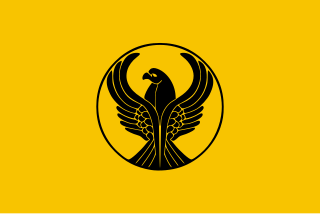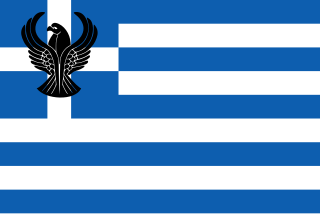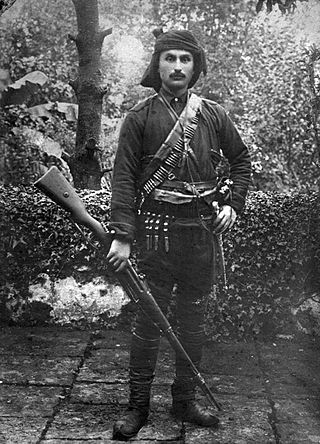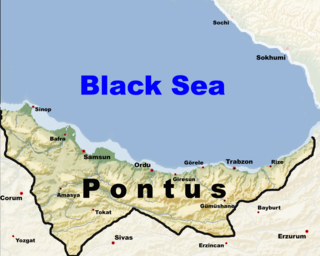Related Research Articles

Kochari is a folk dance originating in the Armenian Highlands. It is performed today by Armenians, while variants are performed by Assyrians, Azerbaijanis, Kurds, and Pontic Greeks. It is a form of circle dance.
Pontic Greek is an endangered variety of Modern Greek indigenous to the Pontus region on the southern shores of the Black Sea, northeastern Anatolia, and the Eastern Turkish/Caucasus region. Today it is spoken mainly in northern Greece. Its speakers are referred to as Pontic Greeks or Pontian Greeks. It is not completely intelligible with modern Demotic Greek.

The Pontic Greeks, also Pontian Greeks or simply Pontians, are an ethnically Greek group indigenous to the region of Pontus, in northeastern Anatolia. Many later migrated in various waves between the Ottoman conquest of the Empire of Trebizond in 1461 and the Russo-Turkish War of 1828–1829. Common migratory destinations included other parts of Eastern Anatolia, the former Russian province of Kars Oblast in the Transcaucasus, and the country of Georgia.

Marcus Antonius Polemon Pythodoros, also known as Polemon II of Pontus and Polemon of Cilicia, was a prince of the Bosporan, Pontus, Cilicia, and Cappadocia. He served as a Roman Client King of Pontus, Colchis, and Cilicia.

The 1923 population exchange between Greece and Turkey stemmed from the "Convention Concerning the Exchange of Greek and Turkish Populations" signed at Lausanne, Switzerland, on 30 January 1923, by the governments of Greece and Turkey. It involved at least 1.6 million people, most of whom were forcibly made refugees and de jure denaturalized from their homelands.

The Greek genocide, which included the Pontic genocide, was the systematic killing of the Christian Ottoman Greek population of Anatolia which was carried out mainly during World War I and its aftermath (1914–1922) on the basis of their religion and ethnicity. It was perpetrated by the government of the Ottoman Empire led by the Three Pashas and by the Government of the Grand National Assembly led by Mustafa Kemal Atatürk, against the indigenous Greek population of the Empire. The genocide included massacres, forced deportations involving death marches through the Syrian Desert, expulsions, summary executions, and the destruction of Eastern Orthodox cultural, historical, and religious monuments. Several hundred thousand Ottoman Greeks died during this period. Most of the refugees and survivors fled to Greece. Some, especially those in Eastern provinces, took refuge in the neighbouring Russian Empire.

The Republic of Pontus was a proposed Pontic Greek state on the southern coast of the Black Sea. Its territory would have encompassed much of historical Pontus and today forms part of Turkey's Black Sea Region. The proposed state was discussed at the Paris Peace Conference of 1919, but the Greek government of Eleftherios Venizelos feared the precarious position of such a state and so it was included instead in the larger proposed state of Wilsonian Armenia. Ultimately, however, neither state came into existence and the Pontic Greek population was killed and expelled from Turkey after 1922 and resettled in the Soviet Union or in Greek Macedonia. This state of affairs was later formally recognized as part of the population exchange between Greece and Turkey in 1923. In modern Greek political circles, the exchange is seen as inextricable from the contemporaneous Greek genocide.

Ottoman labour battalions was a form of unfree labour in the late Ottoman Empire. The term is associated with the disarmament and murder of Ottoman Armenian soldiers during World War I, of Ottoman Greeks during the Greek genocide in the Ottoman Empire and also during the Turkish War of Independence.

Hacı Topal Osman Ağa also known as Osman the Lame, was a Turkish officer, a militia leader of the National Forces, a volunteer regiment commander of the Turkish army during the Turkish War of Independence who eventually rose to the rank of lieutenant colonel, and was a perpetrator of the Armenian and Pontic genocides.

Mithridates or Mithradates VI Eupator was the ruler of the Kingdom of Pontus in northern Anatolia from 120 to 63 BC, and one of the Roman Republic's most formidable and determined opponents. He was an effective, ambitious and ruthless ruler who sought to dominate Asia Minor and the Black Sea region, waging several hard-fought but ultimately unsuccessful wars to break Roman dominion over Asia and the Hellenic world. He has been called the greatest ruler of the Kingdom of Pontus. He cultivated an immunity to poisons by regularly ingesting sub-lethal doses; this practice, now called mithridatism, is named after him. After his death, he became known as Mithridates the Great.

The Pontic Greek genocide was the extermination of native Greek people who lived in the Pontus region of Ottoman Empire in 1914-1923. It was carried out by two regimes: Young Turk led by Three Pashas and Kemalist led by Mustafa Kemal Atatürk. Both massacred and deported Pontians through the Syrian desert. Death estimates vary, but most historians and researchers give estimates of 350,000-360,000 in total.
The Anatolian Greeks, also known as Asiatic Greeks or Asia Minor Greeks, make up the ethnic Greek populations who lived in Anatolia from 1200s BCE as a result of Greek colonization until the forceful population exchange between Greece and Turkey in 1923, though some communities in Anatolia survive to the present day.
The Kemençe of the Black Sea is a Greek and Turkish traditional musical instrument. It belongs to the category of stringed bowed musical instruments. It has three strings, usually tuned to perfect fourths, usually tuned B-E-A. It is the pre-eminent musical folk instrument of the Greeks of Pontus. It seems to have been invented during the Byzantine years, between the 11th and 12th centuries. The instrument is made of different types of wood.

Matthaios Kofidis was an Ottoman Greek businessman, historian and a politician, who was a member of the Ottoman Parliament. He was elected in three successive periods from 1908 to 1918. In 1921 he was among the notables of the Greek community of the Pontus region who were hanged by the Turkish nationalists of Mustafa Kemal.

The Amasya trials in 1921, were special ad hoc trials, organized by the Turkish National Movement, with the purpose to kill en masse the Greek representatives of Pontus region under a legal pretext. They occurred in Amasya, modern Turkey, during the final stage of the Pontic Greek genocide. The total number of the executed individuals is estimated to be ca. 400-450, among them 155 prominent Pontic Greeks.
The Samsun deportations were a series of death marches orchestrated by the Turkish National Movement as part of its extermination of the Greek community of Samsun, a city in northern Turkey, and its environs. It was accompanied by looting, the burning of settlements, rape, and massacres. As a result, the Greek population of the city and those who had previously found refuge there—a total of c. 24,500 men, women and children—were forcibly deported from the city to the interior of Anatolia in 1921–1922. The atrocities were reported by both American Near East Relief missionaries and naval officers on destroyers that visited the region.

The Greek genocide Memorial in Piraeus is a major monument located in the Greek port city of Piraeus. It commemorates the genocide of the Pontic Greeks. The monument is situated in the Alexandra Square in Piraeus. The work consists of a contemporary sculpture created by artist Panagiotis Tanimanidis, who named it "Pyrrhic Flight." It was formally unveiled at a special ceremony in Piraeus on May 21, 2017. The ceremony marked the first time that memorial events to commemorate the genocide had taken place in Piraeus.

Not Even My Name is the biography of Sano Halo, who survived the Greek genocide and moved to the United States of America. The book was written by Sano Halo's daughter, Thea Halo, and first published in 2000 by Picador, an imprint of Macmillan Publishers. The biography focuses on Sano Halo's experience during and immediately after the genocide. Not Even My Name was originally published in English in the US, but it has been translated into Dutch, Icelandic, and Greek.
References
- ↑ Warda, Gladys (2000). "Thea Halo, Not Even My Name: From a Death March in Turkey to a New Home in America. A Young Girl's True Story of Genocide and Survival" (PDF). Journal of Assyrian Academic Studies. 14 (2): 118–121. Archived from the original (PDF) on 31 August 2003.
- ↑ Papageorgiou, Popi (19 December 2014). "Συνέντευξη: Η Σάνο Χάλο, η "Γιαγιά των Ποντίων", μέσα από τα μάτια της Θία Χάλο" [Interview: Sano Halo, the 'Grandmother of the Pontians,' Through the Eyes of Thea Halo]. Pontos News (in Greek). Retrieved 6 November 2022.
- ↑ "Obituary: Sano Themia Halo (1909-2014)". Armenian Weekly. May 4, 2014.
- ↑ Hedges, Chris (27 September 2000). "A Few Words in Greek Tell of a Homeland Lost". The New York Times. Sec. 1, p. 49. Retrieved 6 November 2022.